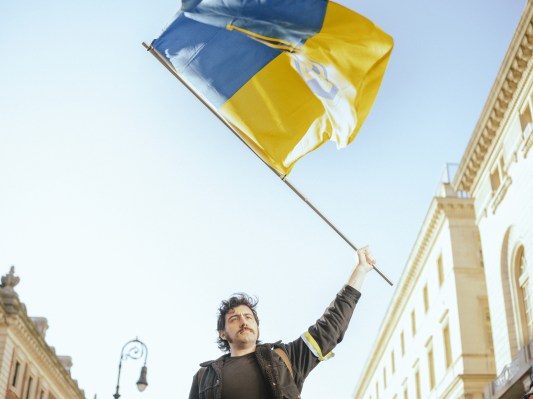On Saturday, Ukraine’s official Twitter account shared two cryptocurrency wallet addresses — a bitcoin wallet address and an Ethereum wallet address. “Stand with the people of Ukraine. Now accepting cryptocurrency donations. Bitcoin, Ethereum and USDT,” @Ukraine wrote.
But it’s hard to know for sure who owns and operates these wallets — a public address is just a long string of letters and numbers. They don’t technically belong to anyone as someone can transfer the ownership of a wallet.
The first logical reaction to a tweet like that is that you should proceed with extreme caution. It is unclear if those wallets are run by a government member, a government agency, someone outside of the government who is informally facilitating crypto donations on behalf of the government or someone pretending to be a government member.
But there are several reasons why it looks more likely than unlikely that the Ukrainian government is in control of the funds received on these wallet addresses. First, the tweet hasn’t been deleted, which most likely rules out the possibility that @Ukraine has been compromised. People running the official government account would have removed the tweet relatively quickly if somebody had hijacked the account.
Second, other people shared those wallet addresses, starting with Ukraine’s Vice Prime Minister and Minister of Digital Transformation Mykhailo Fedorov. “Stand with the people of Ukraine. Now accepting cryptocurrency donations,” Fedorov wrote.
Third, a spokesperson for Ukraine’s ministry of digital transformation confirmed that the tweet from @Ukraine is genuine. “Yes, these accounts are state-owned; we’ve created a special crypto fund,” a spokesperson told me in an email.
And many people have already sent crypto assets to those addresses. This part is easier to figure out as you can simply enter the public addresses into a blockchain explorer to see the list of incoming and outgoing transactions.
At the time of writing, we can see on Etherscan that the Ethereum wallet received around 6,800 transactions. Similarly, there have been more than 7,000 transactions related to the bitcoin wallet address.
People sent 153 BTC and 2,230 ETH, currently worth $6.29 million and $6.27 million, respectively. Some donators also sent Ethereum-based crypto assets, such as USDT and USDC.
It’s worth noting that some members of the crypto community also started their own fundraising efforts. Michael Silberling put together a dashboard on Dune Analytics to track crypto donations to the @Ukraine-backed Ethereum wallet address, but also to other community-led projects.
When it comes to outgoing transactions, large sums of ETH have already been transferred to Kuna, a cryptocurrency exchanged based in Kyiv.
“Kuna.io is providing technical support for the Ukrainian fundraise,” a Kuna spokesperson told me in an email. “All funds are safe and are being directed for the government need as requested.”
Kuna founder Michael Chobanian has mostly been active on Telegram, but he recently created his own Twitter account to share details about the donations. (The Kuna team confirmed in an email that the account is a legitimate account.)
Chobanian started sharing progress updates on the fundraising effort:
There are still a few outstanding questions. Which currency are the crypto assets exchanged for? And how are these funds spent?
TechCrunch has asked the Ukrainian government for more details about the funds. We’ve also reached out to Kuna’s Michael Chobanian but haven’t heard back at the time of writing.
In other words, there will be room for more stories on the topic. But it’s already interesting to see how a tweet containing a handful of crypto wallet addresses started a large-scale fundraising campaign with donors from all around the world in a matter of hours.
